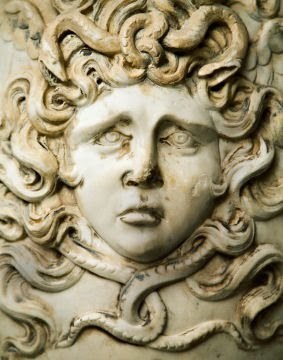Memory and Medusa

As writers, we live in our memories. From the outside, we often appear to be doing nothing at all, staring into the void, seemingly oblivious to the outside world -- and, in a sense, we are. We are absent, in the same way that an aborigine, on his walkabout, is absent from his community. We leave for much the same reason as our hypothetical aborigine, for the internal journeys we take are how we create ourselves and, in turn, the writing that is us.
There's a famous passage in Moby Dick, called "The Try Works," where Melville describes the furnaces, on the Pequod's deck, where whale blubber is rendered. At a certain point in the process, there's no need to consume precious wood to keep the fires going -- the whale's bones themselves become the fuel used to extract the desired whale oil. At that moment, Melville chooses to quote John Webster, a playwright who was one of Shakespeare's contemporaries. He wrote, "Like diamonds, we are cut with our own dust."
That is what we do with memories -- whether they are our own, those of our friends, or from past readings. The dust we use to cut and polish ourselves, and our writing, is no more than ourselves, the stuff we've stored away in our brains. In our internal try works, we turn our memories over, again and again, slowly stewing them 'til they have reduced themselves to pure oil.
However, a curious thing happens to the memories themselves in the rendering. Like Melville's blubber, they cease to exist once the oil has been extracted. Memories remain alive because every time we revisit them we add tiny bits of experience we've accumulated since our last visit. A memory exists, as a memory, specifically because it is malleable, transforming itself along with us. Once it has been written down, it is no longer our memory -- it is now writing: static, unchanging, even if not literally carved-in-stone.
Like the gorgon, we lithify memories with our stare.
As writers, we feel a twinge of remorse at the loss of our memories, as they are no longer the vibrant living things that attracted us to them in the first place. Ironically, the memories we capture in our writing -- no longer alive for us -- can now become part of the living memory of our readers, where it is once again free to transmute itself endlessly.
Published on January 06, 2011 04:59
No comments have been added yet.



